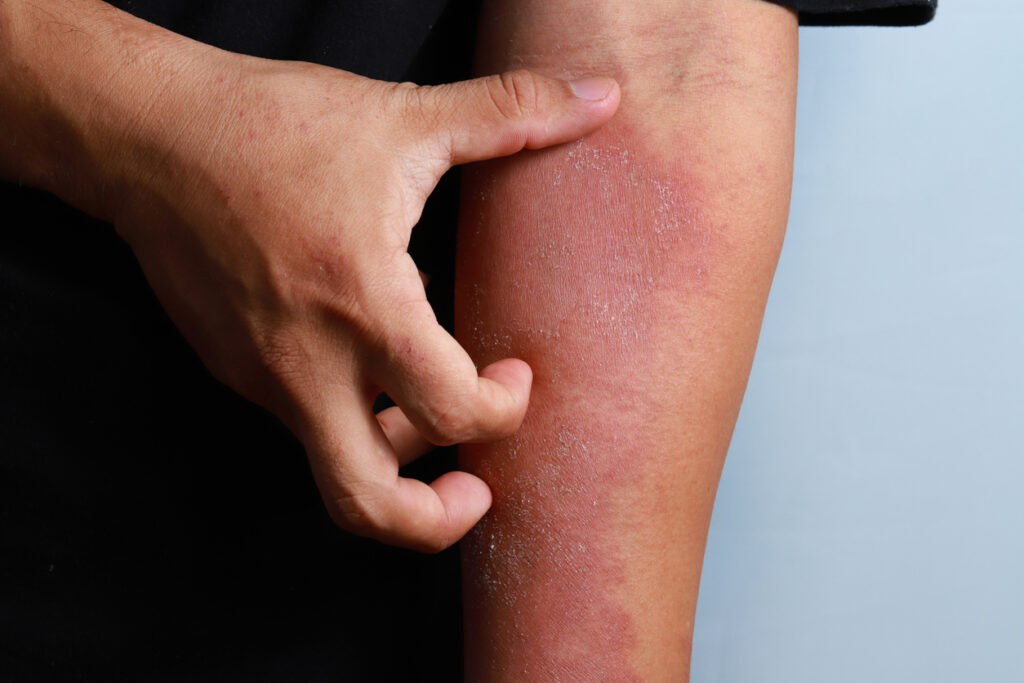Apogee Therapeutics, Inc.’s APG777 met all primary and key secondary endpoints and exceeded trial objectives, according to new 16-week data from Part A of the Phase 2 APEX clinical trial in patients with moderate-to-severe atopic dermatitis (AD).
APG777 is a novel, subcutaneous half-life-extended monoclonal antibody targeting interleukin (IL)-13.
The Phase 2 APEX clinical trial is a randomized, placebo-controlled study evaluating APG777 in patients with moderate-to-severe AD. Part A of the trial enrolled 123 adult patients who were randomized 2:1 to APG777 versus placebo and received an induction regimen dosing of 720mg at Weeks 0 and 2, followed by 360mg at Weeks 4 and 12. Patients benefiting from treatment continued maintenance dosing, evaluating 3- or 6-month dosing of APG777. The primary endpoint of Part A is mean percentage change in Eczema Area Severity Index (EASI) score from baseline at Week 16. Secondary endpoints include EASI-75, EASI-90, Validated Investigator Global Assessment (vIGA) 0/1 and Itch Numeric Rating Scale (NRS) at Week 16.
Initial 16-week findings from APEX Part A include efficacy results, which compare favorably versus standard of care across endpoints as well as rapid onset of itch relief and lesion reduction, and a favorable safety profile consistent with its class.
Met Primary Endpoint
The trial met its primary endpoint, with APG777 showing significantly greater least squares mean percent change from baseline at Week 16 with an EASI reduction of 71.0% compared to placebo of 33.8%. The highest absolute and placebo-adjusted EASI-75 of any biologic was reached with 66.9% of participants treated with APG777 achieving EASI-75 compared to 24.6% on placebo, the study showed. A pre-specified sensitivity analysis showed consistent results in both moderate and severe patients.
Additionally, an exposure-response relationship was observed, with patients in the two highest quartiles of exposures achieving the highest EASI-75 response at Week 16, 83.3% for quartile three, and 89.5% for quartile four.
Key secondaries were in line with standard of care, including vIGA 0/1 and EASI-90. Patients in the highest quartile of exposures achieved the highest response, 63.2% vIGA 0/1 and 63.2% EASI-90 at Week 16.
Treatment of patients with APG777 led to rapid onset of itch relief and achieved statistically significant reduction by Week 1. There was a 50.7% reduction of Itch NRS from baseline compared to 23.2%. APG777 was well tolerated with a safety profile consistent with other agents in the class.
TEAEs Were Rare
Serious treatment-emergent adverse events (TEAEs) were rare for APG777-exposed patients (1.2% vs. 2.4% in placebo), and discontinuation rate due to adverse events was low for APG777-exposed patients.
The most common TEAEs (occurring in ≥5% of patients in either treatment group) were non-infective conjunctivitis, upper respiratory tract infection, and nasopharyngitis, the latter two numerically lower in APG777-treated patients. There were no injection-site reactions in the APG777 group.
“The Phase 2 Part A results are exciting, with APG777 demonstrating promising efficacy results from only four injection days over the initial 16-week induction period,” says Emma Guttman-Yassky, MD, PhD, Waldman Professor of Dermatology and Immunology and Health System Chair of the Kimberly and Eric J. Waldman Department of Dermatology at the Icahn School of Medicine at Mount Sinai in New York City, in a news release. “Despite meaningful advances in atopic dermatitis treatment, there remains a significant unmet need to reduce the injection burden for patients while continuing to improve patient outcomes. I look forward to seeing the first half-life-extended antibody in AD progress, and I am excited about Apogee’s studies that are bringing this therapy closer to patients.”
What’s Next?
APEX Part B is testing a higher dose of APG777. APEX Part B is a placebo-controlled dose optimization with approximately 280 patients randomized 1:1:1:1 to high-, medium-, or low-dose APG777 versus placebo. Part B continues to enroll participants with readout expected in mid-2026. Data readout from the maintenance phase of APEX Part A, testing 3- and 6-month maintenance dosing, is expected in the first half of 2026.
“With two out of every three patients treated with APG777 achieving EASI-75 response at Week 16 in the Phase 2 APEX Part A trial, APG777 demonstrated the highest EASI-75 response rate both on a topline and placebo-adjusted basis for any biologic in a global study to date, reinforcing its potential best-in-class profile for patients with moderate-to-severe atopic dermatitis,” says Michael Henderson, MD, Chief Executive Officer of Apogee. “APG777 has the potential to set a new standard of care by offering improved clinical responses with transformational quarterly or better maintenance dosing — benefitting patients, providers, and payers.
“Today’s results bring us closer to that vision, and we believe further de-risks APG777’s path to approval. In addition, I am excited for our two upcoming readouts to potentially even further improve on efficacy results — the accelerated APEX Part B testing higher exposures that is now expected to readout mid-2026, and the ongoing APG279 (IL-13 + OX40L) head-to-head trial against DUPIXENT expected to readout in the second half of 2026.”
Strong Efficacy Results
“Today’s results from APEX Part A demonstrate strong efficacy results across all key endpoints,” adds Carl Dambkowski, MD, Chief Medical Officer of Apogee. “In addition to these potentially best-in-class results, increased response rates were observed in patients with higher exposures, supporting our exposure-response hypothesis which we continue to further test in APEX Part B. Combined with a favorable safety profile, these findings reinforce APG777’s potential to deliver meaningful and durable benefit to patients while significantly reducing dosing frequency compared with existing agents. On behalf of the entire Apogee team, I’d like to extend our gratitude to the patients and physicians for their support in the successful execution of this important trial.”


